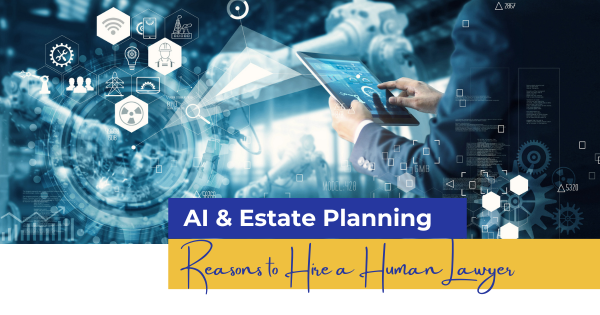ESTATE PLANNING NEWS & ARTICLES
AI and Estate Planning: Why Attorneys are Critical

A detailed article in Forbes recently talks all about AI and estate planning. It is not a surprise that as AI continues to infiltrate all areas of our lives, that its use in estate planning would come up. The author, Matthew Erskine, makes some spot on points about how AI is not quite ready to plan your legacy just yet. His main points include:
- Too impersonal and generic
- Can’t anticipate a future with your particular goals and circumstances
- Can’t replace human experience
- Runs the risk of data leaks and privacy violations (at least for now)
- Not at the same level of critical thinking when it comes to tax, legal and financial concepts as a seasoned estate attorney
- Doesn’t provide the moral and ethical guidance that humans can provide
- It can’t give peace of mind that your wishes with be carried out in protection of your family
How AI Can Assist Attorneys
All good and valid points. While I can’t envision a time when AI would completely replace the need for human involvement and legal expertise in estate planning, it can offer certain tools and support that could be helpful throughout the process. Here are a few ways AI might be useful in estate planning in the future:
1. Document and Data Management: AI can help organize and manage large amounts of data related to an individual’s assets, including financial accounts, properties, investments, and insurance policies. It can extract relevant information from documents, categorize data, and provide a consolidated view for estate planning purposes.
2. Decision Support: AI algorithms can assist in decision-making by providing insights and recommendations based on specific criteria. For example, AI can analyze tax implications and estate laws to optimize the distribution of assets, considering factors such as inheritance taxes, trusts, and beneficiaries’ needs.
3. Risk Assessment: AI can help identify potential risks and vulnerabilities in an estate plan. It can analyze different scenarios and simulate outcomes to evaluate the effectiveness of various strategies. This can help individuals and their legal advisors make more informed decisions to mitigate potential risks.
4. Natural Language Processing: AI-powered chatbots or virtual assistants can interact with users to gather necessary information for estate planning. They can understand and respond to natural language queries, making the process more user-friendly and accessible.
Most of this still looms where it belongs in the future. However, it’s important to note that estate planning’s complex legal and financial considerations still 100% require human expertise. At this time, at most, AI tools should be used as aids, not replacements, to work in conjunction with legal professionals and financial advisors.
Estate planning involves personal preferences, family dynamics, and legal regulations that require careful human judgment and interpretation. That is why we are proud and happy to be of service to you and to add that personal, human touch that no computer can replicate. Please feel to reach out and schedule your free consultation today.
